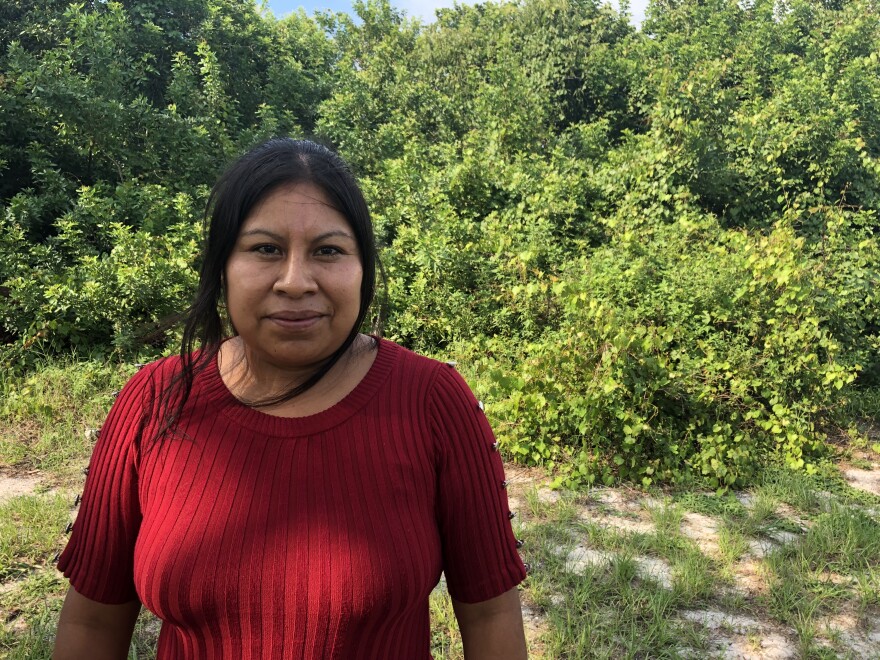Puedes leer una versión de esta historia en Español
Climate change is impacting workers in many segments of the economy, but for those who work the land for a living, the effects can be physical and financial.
Hillsborough County is home to some of the most productive farmland in the state and each season, thousands of workers spend long days in the fields harvesting crops.
Today, as part of WUSF's occasional series on how climate change is impacting the lives of everyday people, we hear from two farmworkers and an advocate.
They spoke with us about a year ago in Wimauma after a town hall of sorts in the park of a migrant housing complex.
YOUR VOICES: How does climate change affect you? Let us know
Adela José, a farmworker in Wimauma's tomato and blueberry fields, is originally from Oaxaca, Mexico, and has worked in Florida agriculture for more than 16 years.
She said she’s noticed the climate getting significantly hotter and colder.
“It's not the same as last year. It's a lot different. It's changing too much," she said in translated Spanish. "The fruit plants, they dry up. They're drying up due to lack of water.”
Even when it rains, she noticed the land dries fast. And, she said, the heat is affecting farmworkers’ health.
"People sometimes they want to have and earn more money and they work harder, and they don't drink a sufficient amount of water,” José said, adding that the effects of the sun are most felt at the end of the day when workers are at home cooling off with the air conditioner.
She said some people are looking for work in other states, but many can’t move because it’s too difficult to do with children.
"Sometimes there's more heat and it doesn't rain because now they're constructing more houses and they're cutting everything that is a tree. Instead of planting trees, they're cutting them," she said.

Antonio Encarnación, who's also from Oaxaca, said he, too, has noticed a lack of rain and an increase in development.
He has lived in Florida for a decade, spending many years in strawberry, blueberry and tomato fields. But now he’s a plumber working in construction.
"In this state of Florida, you can see that the big developers that do construction, when they start a new project, they begin to cut the forest,” he said in translated Spanish. “This has also contributed to the water cycles not being what they were before. "
Encarnación said he’s talked to people who note that in the past, “it rained beautifully in Florida,” but he said that’s not the case now.
"Trees immensely help the ecology to maintain the environment in a favorable condition,” he said. “However, I am not saying that I am against developers, but just looking for what the options are … planting more trees, in such a way that it does not affect future generations."
Ana Lamb, who's a self-described Hispanic activist with the League of United Latin American Citizens, said farmworkers in the Tampa Bay region are telling her that there has not been much of a harvest.
“They have explained to me that they are … even cutting jobs,” Lamb said.
Farmworkers also talked to Lamb about health issues, like the ones Adela José described. She said it’s common to hear a story about a worker passing out and being moved out of the way so that other workers can continue picking produce.
“It could be heat. It could be also diabetes," Lamb said. “They don't take care of their health until they are like, in the very bad shape.”
Lamb said she learned through the years that there are many times when, in eagerness to make more money and get more work done, some farmworkers go into the fields too soon after dangerous chemicals have been applied, instead of waiting until it’s safe.
“They can get sick. It looks like the flu, but in reality, they are the chemicals and nobody is concerned about that," she said. “They just go home, take some Tylenol and that’s it.”
Lamb thinks farm owners and farmworkers should work together on finding solutions.
“There are a lot of farmworkers that they know very good the farms and they have ideas. Let's just start coming together and why not, you know, all the people that has been involved in this, they can bring solutions. So that's … let's say a community effort,” Lamb said.
This story was produced in partnership with the Tampa Bay Climate Alliance.





